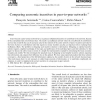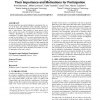77 search results - page 9 / 16 » Participatory design with individuals who have amnesia |
97
Voted
JCM
2007
14 years 11 months ago
2007
Abstract— New applications for Radio Frequency Identification (RFID) technology include embedding transponders in everyday things used by individuals, such as library books, pay...
CHI
2010
ACM
15 years 6 months ago
2010
ACM
Blogging in the enterprise is increasingly popular and recent research has shown that there are numerous benefits for both individuals and the organization, e.g. developing reputa...
CN
2004
14 years 11 months ago
2004
Users who join a peer-to-peer network have, in general, suboptimal incentives to contribute to the network, because of the externalities that exist between them. The result is an ...
ACMACE
2005
ACM
15 years 5 months ago
2005
ACM
In many game-like open-ended multiplayer communities, the success of the game, and well-being of the community, depends on the efforts of certain individuals who arrange resources...
101
click to vote
HCI
2009
14 years 9 months ago
2009
Social annotation systems such as SparTag.us and del.icio.us have been designed to encourage individual reading and marking behaviors that, when shared, accumulate to build collect...


